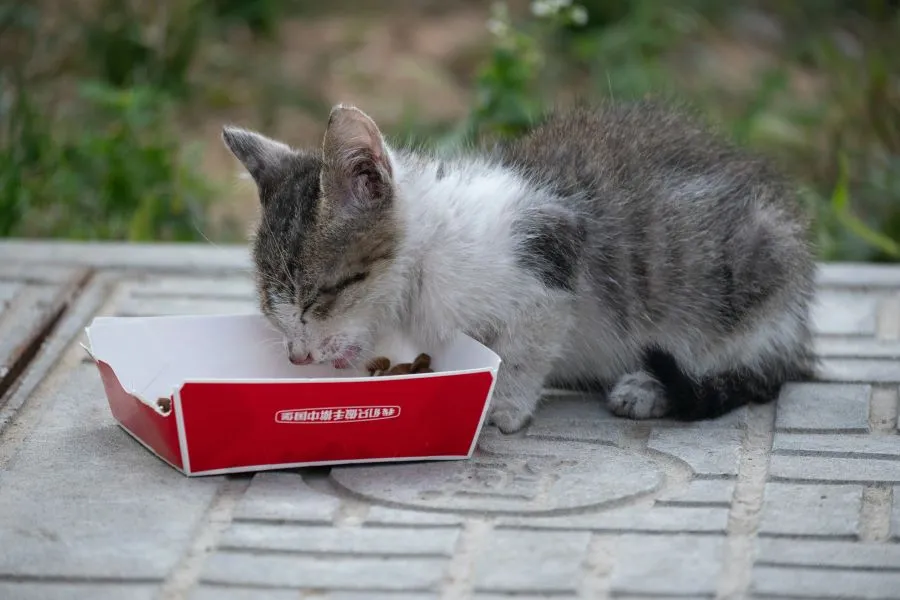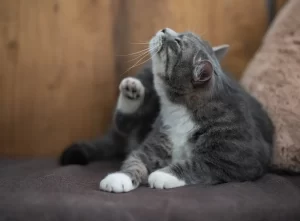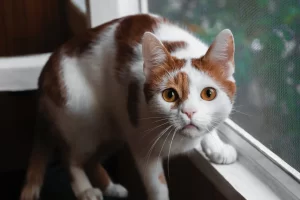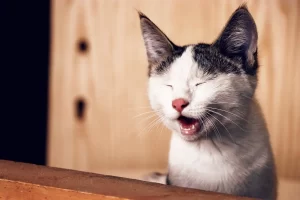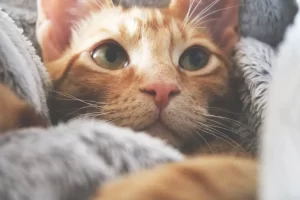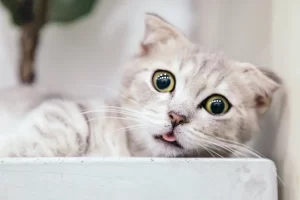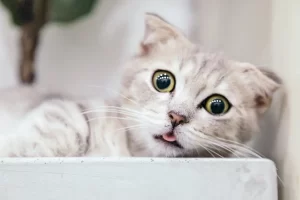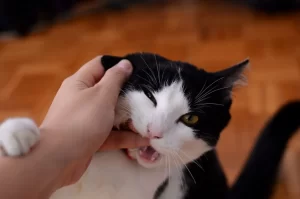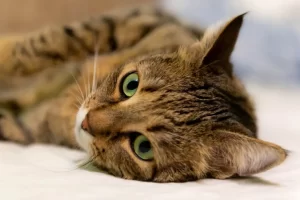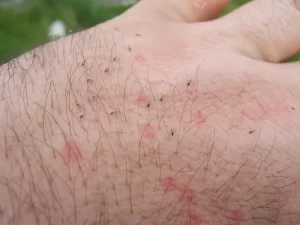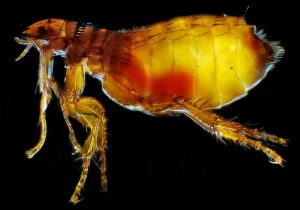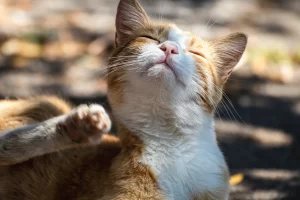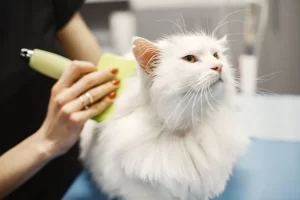Cats are known for their lustrous and glossy coats, which can be a sign of good health. However, some cats may experience hair loss, which can be a cause for concern for their owners. Providing the best food for cat hair loss can play a crucial role in restoring a cat’s healthy coat. In this article, we will discuss the essential nutrients and ingredients that should be included in a cat’s diet to maintain a healthy skin and coat. We will also answer some frequently asked questions about cat hair loss and provide tips on how to prevent and treat it.
Table of Contents
ToggleCauses of Cat Hair Loss
Cat hair loss, also called alopecia, can be caused by a variety of factors. These can include allergies, hormonal imbalances, infections, parasitic infestations, stress, age, and genetic factors. Allergies in cats may result from food, environmental allergens like pollen or dust mites, or flea bites. This can lead to itching, which can then cause hair loss.
Hormonal imbalances such as hyperthyroidism or Cushing’s disease can also be a cause of cat hair loss. Infections like bacterial and fungal infections or parasitic infestations like ringworm or mange can also result in hair loss. Stress can also cause hair loss in cats. Cats that are anxious or stressed may excessively groom themselves, which can lead to hair loss.
As cats age, they may experience thinning or loss of fur due to natural aging processes. Certain breeds of cats may also be more prone to hair loss due to genetic factors.
Nutritional Requirements for Healthy Skin and Coat
Cats require a balanced diet that is rich in essential nutrients to maintain a healthy skin and coat. Some of the key nutritional requirements for a shiny coat and healthy skin include:
- Proteins: Protein is essential for building and repairing tissues, including the skin and coat. Cats require high-quality animal-based proteins, such as chicken, turkey, beef, and fish, in their diet. These proteins provide essential amino acids, which are the building blocks for healthy skin and coat.
- Fats: Fats are essential for maintaining healthy skin and coat in cats. Fatty acids, such as omega-3 and omega-6, are particularly important. Cats cannot produce these fatty acids on their own and must obtain them from their diet. Good sources of these fatty acids include fish oil, flaxseed oil, and chicken fat.
- Vitamins: Several vitamins are essential for maintaining healthy skin and coat in cats. These include vitamins A, D, and E. Vitamin A helps promote healthy skin and coat by regulating the production of skin cells and oil glands. Vitamin D is essential for the absorption of calcium, which is important for bone health. Vitamin E is an antioxidant that helps protect the skin from damage caused by free radicals.
- Minerals: Minerals such as zinc and copper are important for maintaining healthy skin and coat in cats. Zinc plays a crucial role in the formation of keratin, which is a protein that makes up the hair, skin, and nails. Copper is important for the production of melanin, which gives color to the hair and skin.
Top Protein-Rich Foods for Cats: Essential for Preventing Cat Hair Loss
Protein is a critical nutrient for cats as they require it for maintaining healthy skin, hair, and nails. The following are some of the protein-rich foods that can be included in a cat’s diet to help maintain a healthy skin and coat:
- Chicken: Chicken is a good source of lean protein and is often found in commercial cat foods. It is easily digestible and contains essential amino acids that are necessary for healthy skin and coat.
- Turkey: Like chicken, turkey is a lean protein source that is often used in commercial cat foods. It contains essential amino acids, and its high levels of vitamin B6 and niacin help maintain healthy skin.
- Fish: Fish is a rich source of protein and omega-3 fatty acids, which are essential for healthy skin and coat in cats. It is important to note that some types of fish, such as tuna, contain high levels of mercury and should be fed in moderation.
- Beef: Beef is a rich source of protein and contains many essential amino acids that are important for maintaining healthy skin and coat in cats. However, it is important to feed cats lean cuts of beef to avoid excess fat.
- Lamb: Lamb is another protein source that is rich in essential amino acids, including cysteine and methionine, which help to maintain a healthy skin and coat.
When choosing protein sources for cats, it is important to consider their individual needs, as well as any dietary restrictions or health conditions. A balanced diet that includes high-quality protein sources can help ensure a cat maintains a healthy skin and coat.
Top Sources of Omega-3 and Omega-6 Fatty Acids for a Healthy Cat Skin and Coat
Essential fatty acids, including omega-3 and omega-6, are important for maintaining healthy skin and coat in cats. Here are some sources of these essential fatty acids that can be included in a cat’s diet:
- Fish oil: Fish oil is a rich source of omega-3 fatty acids, which have anti-inflammatory properties and help to promote healthy skin and coat in cats. Fish oil can be found in some commercial cat foods, or it can be added to a cat’s diet in the form of a supplement.
- Flaxseed oil: Flaxseed oil is a plant-based source of omega-3 fatty acids that can be added to a cat’s diet to promote healthy skin and coat. It can be found in some commercial cat foods, or it can be added to a cat’s diet in the form of a supplement.
- Chicken fat: Chicken fat is a good source of omega-6 fatty acids, which are essential for maintaining healthy skin and coat in cats. Chicken fat is commonly found in many commercial cat foods and can be a valuable addition to a cat’s diet.
Note that cats have a limited ability to convert plant-based fatty acids (such as those found in flaxseed oil) into the forms that are more readily usable by the body. Therefore, it is recommended to include animal-based sources of essential fatty acids, such as fish oil and chicken fat, in a cat’s diet. You should also remember to provide essential fatty acids in the correct ratio. The ideal ratio of omega-6 to omega-3 fatty acids in a cat’s diet is approximately 4:1 to 10:1. Providing a balance of these essential fatty acids can help promote healthy skin and coat in cats.
Antioxidants in Cat Food and Their Role in Preventing Hair Loss
Antioxidants play an important role in maintaining healthy skin and coat in cats. Here are some sources of antioxidants that can be included in a cat’s diet:
- Fruits and vegetables: Fruits and vegetables are good sources of antioxidants, such as vitamin E and beta-carotene. Some examples of fruits and vegetables that are safe for cats and contain antioxidants include blueberries, spinach, and sweet potatoes.
- Vitamin E supplements: Vitamin E is an antioxidant that can be added to a cat’s diet in the form of a supplement. This can help to protect the skin from damage caused by free radicals.
- Other supplements: There are other supplements that can be added to a cat’s diet to provide antioxidants, such as green tea extract and grape seed extract. However, it is important to speak with a veterinarian before adding any supplements to a cat’s diet.
Keep in mind that while antioxidants can be beneficial for cats, it is possible to overdo it. Too much vitamin E, for example, can be toxic to cats. Therefore, it is important to provide antioxidants in moderation and to speak with a veterinarian to determine the appropriate amount for a cat’s individual needs. In addition to providing antioxidants in a cat’s diet, it is also important to minimize exposure to free radicals. This can be done by avoiding environmental toxins and providing a clean and healthy living environment for the cat.
Sweet Potatoes and Brown Rice: The Best Carbohydrate Sources for Cats
While cats are primarily meat-eaters, they do require a small amount of carbohydrates in their diet. Carbohydrates provide energy and help to maintain healthy digestion in cats. Here are some sources of carbohydrates that can be included in a cat’s diet:
- Sweet potatoes: Sweet potatoes are a good source of carbohydrates for cats. They are also rich in vitamins and minerals, such as vitamin A and potassium. However, it is important to note that cats have a limited ability to digest carbohydrates and may not be able to utilize the nutrients in sweet potatoes as well as they can from animal sources.
- Brown rice: Brown rice is another good source of carbohydrates for cats. It is also high in fiber, which can help to promote healthy digestion. However, like sweet potatoes, brown rice may not be as easily digestible as animal sources of nutrients.
It is important to note that while carbohydrates are important in a cat’s diet, they should not make up a significant portion of their diet. Cats require a diet that is high in protein and fat, and too many carbohydrates can lead to obesity and other health problems. Also remember to choose high-quality sources of carbohydrates, such as sweet potatoes and brown rice, that are easily digestible and provide valuable nutrients for cats.
Grain-Free vs. Grain-Inclusive Diets for Cat Hair Loss
The debate over whether cats should be fed grain-free or grain-inclusive diets has been a topic of discussion among pet owners and veterinarians. Here are some potential benefits and drawbacks of each type of diet:
Grain-Free Diets:
Grain-free diets have become popular in recent years, as some pet owners believe that cats are not able to digest grains properly and that they may be allergic to them. However, there is little scientific evidence to support these claims. Some potential benefits of grain-free diets include:
- Higher protein content: Grain-free diets often contain more protein than grain-inclusive diets, which can help to support lean muscle mass in cats.
- Lower carbohydrate content: Since grains are a source of carbohydrates, grain-free diets may be lower in carbohydrates than grain-inclusive diets. This can be beneficial for cats that are prone to obesity or diabetes.
- Fewer potential allergens: Grain-free diets may be beneficial for cats that have food sensitivities or allergies to grains.
Some potential drawbacks of grain-free diets include:
- Higher cost: Grain-free diets are often more expensive than grain-inclusive diets, which can make them less accessible to some pet owners.
- Lack of fiber: Since grains are a source of fiber, grain-free diets may be lower in fiber than grain-inclusive diets. This can lead to digestive issues in some cats.
Grain-Inclusive Diets:
Grain-inclusive diets contain grains, such as rice, wheat, or corn. Some potential benefits of grain-inclusive diets include:
- Lower cost: Grain-inclusive diets are often less expensive than grain-free diets, which can make them more accessible to some pet owners.
- Source of fiber: Grains are a source of fiber, which can help to promote healthy digestion in cats.
- Balanced nutrition: When formulated correctly, grain-inclusive diets can provide a balanced and complete source of nutrition for cats.
Some potential drawbacks of grain-inclusive diets include:
- Potential allergens: Some cats may be allergic to grains or have food sensitivities to them.
- Higher carbohydrate content: Since grains are a source of carbohydrates, grain-inclusive diets may be higher in carbohydrates than grain-free diets. This can be a concern for cats that are prone to obesity or diabetes.
Best Prescription Diets for Cat Hair Loss and Skin Issues
Prescription diets can play a crucial role in addressing underlying health conditions that may be contributing to hair loss in cats. Here are some of the prescription diets available for cats with hair loss and their potential benefits:
- Hypoallergenic Diets: Cats that have food allergies or intolerances may benefit from hypoallergenic diets. These diets typically contain a limited number of ingredients, which can help to minimize the risk of allergic reactions. Hypoallergenic diets may be made with novel proteins, such as venison or duck, that the cat has not been exposed to before. Some hypoallergenic diets also contain hydrolyzed proteins, which have been broken down into smaller molecules that are less likely to trigger an immune response.
- Dermatologic Diets: Dermatologic diets are designed to support skin health and address conditions such as dermatitis and alopecia. These diets may contain ingredients that are high in essential fatty acids, such as fish oil, which can help to improve the skin’s barrier function and reduce inflammation. Dermatologic diets may also contain ingredients that are high in antioxidants, such as vitamin E and beta-carotene, which can help to protect the skin from damage.
- Urinary Tract Health Diets: Some cats with hair loss may also have urinary tract issues, such as bladder stones or urinary tract infections. Urinary tract health diets are designed to help prevent the formation of bladder stones and support urinary tract health. These diets may be low in minerals that can contribute to stone formation, such as magnesium and calcium, and may contain ingredients that promote urine dilution, such as cranberries or citrus extracts.
- Weight Management Diets: Cats that are overweight or obese may be more prone to hair loss due to the increased strain on their skin and hair follicles. Weight management diets are designed to help cats lose weight or maintain a healthy weight. These diets may be lower in calories and higher in protein to help cats feel full and maintain lean muscle mass.
Top Supplements for Cat Hair Loss: A Guide for Pet Owners
Supplements can be a helpful addition to a cat’s diet, particularly for those with hair loss. Here are some of the supplements that may be beneficial for cats with hair loss and their potential benefits:
- Biotin: Biotin is a B-vitamin that is important for healthy skin and coat. It helps to strengthen hair and nails, and may also reduce inflammation in the skin. Biotin can be found in many cat foods, but supplements are also available.
- Zinc: Zinc is a mineral that is important for healthy skin and coat. It helps to regulate oil production in the skin, which can reduce dryness and improve coat condition. Zinc can be found in many cat foods, but supplements are also available.
- Omega-3 Fatty Acids: Omega-3 fatty acids, such as those found in fish oil, can help to reduce inflammation in the skin and improve coat condition. They may also reduce itching and scratching in cats with allergies or skin conditions.
- Probiotics: Probiotics are beneficial bacteria that can help to support digestive health and reduce inflammation in the gut. This can have a positive impact on the skin and coat, as the health of the digestive system is closely linked to the health of the skin.
Frequently Asked Questions (FAQs) about Best Food for Cat Hair Loss
Can diet alone cure cat hair loss?
Diet alone may not be enough to cure hair loss in cats. It is important to address any underlying health conditions that may be contributing to the hair loss, such as allergies or hormonal imbalances.
Is a raw food diet good for cats with hair loss?
A raw food diet can be beneficial for cats with hair loss, as it can provide high-quality protein and essential fatty acids. However, it is important to ensure that the diet is balanced and provides all the necessary nutrients.
Can certain foods cause hair loss in cats?
Certain foods, such as those that are high in carbohydrates or low in protein, may contribute to hair loss in cats. It is important to feed cats a balanced diet that meets their nutritional needs.
Can supplements cause side effects in cats?
Supplements can cause side effects in cats, particularly if they are used inappropriately or in high doses. It is important to follow the dosing instructions and only use supplements under the guidance of a veterinarian.
Can cats be allergic to certain foods?
Yes, cats can be allergic to certain foods, which can cause skin irritation and hair loss. Common allergens include chicken, beef, and dairy products.
Can changing a cat’s diet cause hair loss?
Changing a cat’s diet can sometimes cause temporary hair loss, as the cat’s body adjusts to the new diet. However, if hair loss persists, it may be a sign of an underlying health issue.
Can commercial cat food provide all the necessary nutrients for healthy skin and coat?
Commercial cat food can provide all the necessary nutrients for healthy skin and coat, as long as it is balanced and provides high-quality protein, essential fatty acids, and other key nutrients.
Is it necessary to supplement a cat’s diet with vitamins and minerals?
In most cases, it is not necessary to supplement a cat’s diet with vitamins and minerals, as long as the cat is eating a balanced diet. However, supplements may be beneficial for cats with specific health issues.
How can I tell if my cat’s diet is balanced?
A balanced diet for cats should provide high-quality protein, essential fatty acids, vitamins, and minerals. You can check the ingredients list on your cat’s food to ensure that it contains these key nutrients.
How long does it take for a cat’s hair to grow back after hair loss?
The length of time it takes for a cat’s hair to grow back after hair loss depends on the underlying cause of the hair loss. In some cases, it may take several weeks or months for the hair to regrow.
Can dry food cause hair loss in cats?
Dry food may not provide enough moisture for some cats, which can lead to dry skin and hair loss. It is important to provide cats with plenty of fresh water and to consider feeding wet food or adding moisture to their dry food.
Is it okay to feed cats human food for hair loss?
Some human foods can be beneficial for cats with hair loss, such as lean meats and fish. However, it is important to ensure that the foods are safe for cats and do not contain any harmful ingredients.
Can stress cause hair loss in cats?
Yes, stress can cause hair loss in cats. It is important to identify and address any sources of stress in the cat’s environment, such as changes in routine or the introduction of a new pet.

